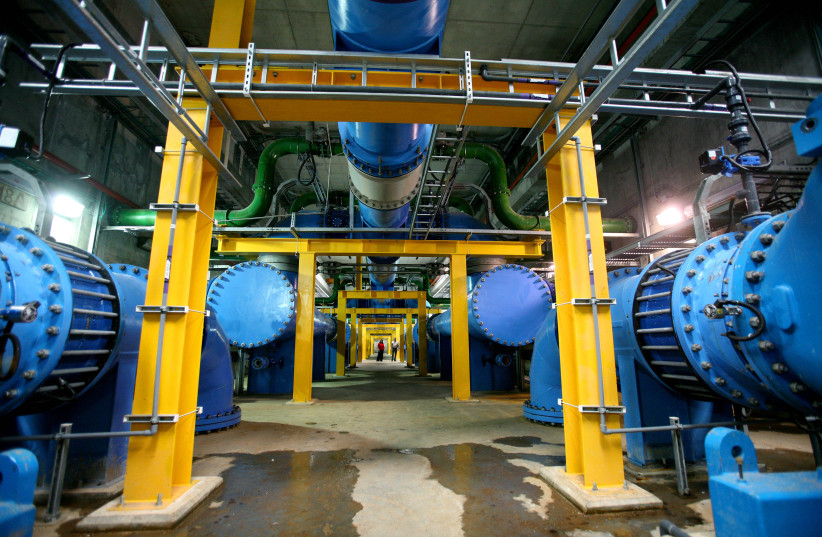Israel’s national water company has a road map to the future and it’s rooted in innovation.
Published on by Water Network Research, Official research team of The Water Network in Case Studies

Mekorot, Israel’s national water company, has been dipping its toes into the waters of the tech sector, developing innovations that could be applied to multiple sectors in Israel and the world.
Mekorot, which has been operating in the country since 1937, began investing heavily in breakthrough technologies in March of 2018, when the Knesset approved an initiative allowing companies like Mekorot, who are involved with and subsidized by the Israeli government, to do so.
Mekorot, listed on the Tel Aviv Stock Exchange, is a government company that operates under the Infrastructure, Energy and Water Resources Ministry as well as the Finance Ministry, providing 80% of the drinking water in Israel and 70% of overall water consumption in the country.
It is also a world leader in big data, energy management, water quality and cyber protection with innovative developments that work well and have proven themselves in the field.
Mekorot’s technologies improve the quality of water production and its consumption and provide a myriad of benefits to the Israeli economy, while reducing cost of living. They could also greatly improve the energy consumption, big data and cybersecurity sectors across the world, among other examples.
As part of Mekorot’s “digital and technological revolution,” as it was termed by the general manager of Innovation and Ventures at Mekorot, David “Dudi” Balsar, the national water company has been investing in start-ups to develop proprietary technologies alongside Mekorot that will further improve the aforementioned sectors – from fiber optics, to water desalination, to chlorine deployment, to cybersecurity and back to big data management.
Within these agreements, Mekorot buys out up to 20% of each of the start-up companies they enter into partnerships with – earning Mekorot a seat on the board as a partner – and the two then work side by side to forward the new technologies.
“Our investment philosophy is quite unique,” Balsar explained. “Water is a very traditional industry, so water technologies take long cycles to adopt in scale, like 10 years, 12 years, 15 years. So what we decided to do in our investment philosophy is to tap into other industries and other proven technologies from other domains and integrate them into water,” which in turn “saves a lot of time between adoption, deployment and implementation, and expedites the whole process.”

FOCUSING ON fiber optics – to give a better idea of the manner in which Mekorot approaches innovation in the tech sector – the water company developed a way to fish fiber optic lines throughout the country using its already existing pipeline infrastructure that stretches from the far reaches of northern Israel down to the southern tourist town of Eilat.
To do so, Mekorot fashioned a way to insert fiber optics cables into the pipelines and dispatch them throughout the country using what was described as a sort of “parachute” system that carries and transports the communication lines from one section of the country to the other.
Mekorot researchers and cohorts found the insertion of lines to have no effect on the fiber optics themselves or the water surrounding it.
This makes it a prominent option to provide high-speed Internet to the entirety of the country – especially sections that would otherwise not have access to these technologies – at a lower cost than it would have originally been if the fiber optics cables were to be disseminated using non-existing infrastructure that would either have to be commissioned or constructed from scratch.
The capabilities attached to the fiber optic cables also provide the company with the option to identify the leakage, theft and loss of what is called “non-revenue water,” in addition to the status of the pipes - as the fiber optic lines make their way throughout the country.
This type of methodology, the reuse and improvement of existing infrastructure and technologies, and formulating them to address the unique needs of Mekorot, is a common theme among the multitude of technologies being pioneered by the national water company.
Within the energy sector, Mekorot is installing solar energy infrastructure over top of its already existing reservoirs, spread far and wide throughout the country.
Annually, Mekorot uses and disseminates 2.2 gigawatts of electricity throughout Israel using traditional means of harnessing energy, such as fossil fuels, hydropower, etc.
To address these needs, Mekorot commissions Israeli tech entrepreneurs specializing in energy projects to fashion and manage the solar fields that will float on top of its reservoirs, sort of like a barge – sitting on top of anything from portable, to agricultural, to well water – with the hopes these sorts of projects will lead to lowering energy costs and eventually turn Mekorot’s energy consumption completely green within the next five to 10 years.
The methodology has a wide range of benefits for the specific project itself. To start off, by using the reservoirs, it removes the need for Mekorot to buy extra land to build these solar fields on top of, and with land being worth far more than gold or diamonds in this small country. The cheeky innovation cuts the cost of the project astronomically.
The solar fields and the reservoirs also share a mutually beneficial relationship, whereas the solar panels cool down the water and prevent water from escaping due to evaporation, and vice versa, where the water cools down the solar panels.

The two unique innovations attached to this project not only decrease the cost it takes to commission the construction of the solar fields, they also decrease the cost it takes to operate and generate electricity from the solar fields, and within that the price at which Mekorot and Israelis would buy their energy at, as the money-saving dominoes fall down the line.
WITH REGARD to Mekorot’s traditional responsibilities as Israel’s national water company, the company is also working with start-ups to improve its water management processes.
From chemical deployment to big data management and over to cybersecurity, Mekorot has been working to revitalize and ameliorate its processes to benefit the public and the company as a whole.
A recent start-up that Mekorot entered into a partnership with developed a way in which to manufacture and disperse chlorine directly into the pipelines that disseminate the waters throughout the country using the water salinity. Chlorine is a chemical mandated by the government to be inserted into drinkable water. Within this, it removes the need to manually transport the chlorine from location to location, which has proven to be a costly and also dangerous process to undertake.
Aside from chemical disbursement, Mekorot has also entered into the cybersecurity sector. Using existing technologies from the oil and gas sector, Mekorot migrated an IOT software solution and positioned it to address the unique architecture of the water industry.
Within its innovation, aside from alerting and identifying leakages and losses in non-revenue water using hi-tech sensors, Mekorot fashioned it to alert pipeline operators and locate any anomalies or attempted cyberattacks on the water disbursement systems.
Taxonomy
- Utility Provider
- Water Utility
- Wastewater Treatment Plant Design
- Utility Management
- Energy Plant Design
- Public Utility
- Public Utility